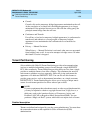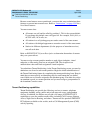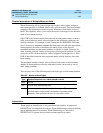
DEFINITY ECS Release 8.2
Administrator’s Guide
555-233-506
Issue 1
April 2000
Features and technical reference
1536Tenant Partitioning
20
■ Consult
Consult calls use the temporary bridged appearance maintained on the call.
At the conclusion of a consult call, the bridged appearance is no longer
maintained. If the principal chooses not to talk with the calling party, the
principal cannot bridge onto the call later.
■ Conference and Transfer
If a call has, or has had, a temporary bridged appearance; is conferenced or
transferred; and redirects to coverage again; a temporary bridged
appearance is not maintained at the conferenced-to or transferred-to
extension.
■ Privacy — Manual Exclusion
When Privacy — Manual Exclusion is activated, other users are prevented
from bridging onto a call. A user who attempts to bridge onto a call when
this feature is active is dropped.
Tenant Partitioning
(Not available with Offer B) Tenant Partitioning provides telecommunications
services to multiple independent groups of users through a single DEFINITY
ECS. Most commonly, Tenant Partitioning provides these services from a single
provider to multiple tenants of an office complex. This eliminates the need for
each tenant to purchase services separately, while still giving each tenant the
appearance of a dedicated DEFINITY ECS. You can also use this feature to
provide group services, such as departmental attendants, on a single-customer
DEFINITY ECS. Tenant Partitioning also allows you to assign a unique music
source for each tenant partition for callers who are put on hold.
NOTE:
If you use equipment that rebroadcasts music or other copyrighted materials,
you may be required to obtain a copyright license from, or pay fees to, a
third party such as the American Society of Composers, Artists, and
Producers (ASCAP) or Broadcast Music Incorporated (BMI). You can
purchase a Magic-on-Hold
®
system, which does not require such a license.
Detailed description
Tenants are defined and assigned by you, the system administrator. You must have
the same authorization as that required for Class of Restriction (COR)
administration.


















